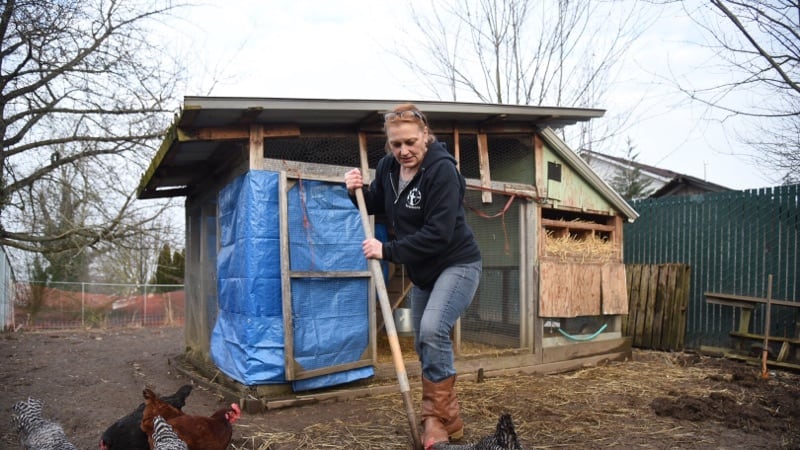The effects of a red-hot housing market are writ large on the Portland skyline. More than 5,300 new units of housing were approved last year, yet that didn't stop market-rate rents from rising 13 percent, further pushing low-income families to the margins of the city and reducing the housing options for those who remained.
But sometimes the most upsetting changes can be small.
Like a 50-by-20-foot chicken coop.
The Seattle-based owner of a North Portland low-income apartment complex is threatening to remove an 18-bird coop from a backyard area behind one of its many large buildings.
It's the only chicken coop at a low-income apartment complex in Portland. Residents at the St. Johns complex, Cathedral Gardens, say the coop provides valuable education for neighborhood children who otherwise get little contact with animals.
It's also the only coop on city-owned property—the building was publicly owned until sold to private landlords in 2013, and the chickens sit on Portland Parks & Recreation land.
"We don't want the chickens gone, for the kids' sake," says longtime resident Shirley Cordoba, 79. "We're trying everything in the world to keep them here."
The coop's manager, Brad Melaugh, of youth community garden nonprofit Village Gardens, says the buildings' owners have told him the chickens have to be out by the end of February.
The owner, affordable housing developer Vitus Group in Seattle, denies that, and says it hasn't decided the chickens' fate.
In a statement, Vitus manager Sara Wall writes, "If the resident volunteers lack the capacity to care for the chickens in a humane way with minimal disruption to their neighbors, and maintain a clean and sanitary environment, it is in the best interest of the animals and our residents to relocate them."
The squabble may seem minor, but raising backyard chickens is an archetypal Portland experience. The planned removal raises questions about what the city's poorest citizens can expect when public housing is outsourced to private interests.
For residents, saving the chickens is a way of preserving a sense of home, a connection to nature and a cheap, healthy food source.
"It's very important," says resident Cathy Haas, whose grandchild named two of the chickens Blondie and Meanie. "It gets the kids off of the street, doing something else besides getting in trouble."
One morning last month, the chickens had drawn a trio of Latino children to the coop at Cathedral Gardens. The children plucked grass to feed the hens.
"Oh God, don't peck me, pollito!" cried Gabriel, one of the three elementary school-aged kids who laughed hysterically while dodging the birds' sharp beaks.
"I like eggs," said his friend Adrian.
"I like beaks," Gabriel added.
Built in 1971, the 125-unit apartment complex is tucked alongside Pier Park's disc golf course and North Columbia Boulevard. The buildings are set aside for the city's poorest residents: A family of four must make less than $36,650 a year to live here.
Cathedral Gardens, once known as St. Johns Woods, has long been public housing. But it's one of four area apartment complexes to be sold to out-of-state investors since 2012.
Vitus purchased Cathedral Gardens, whose rents are publicly subsidized through the Section 8 program, from Home Forward, the Multnomah County public housing authority, in 2013 for $8.3 million.
Tim Collier, a spokesman for Home Forward, says Vitus asked to buy the property, which was in disrepair, with a promise to fix it up and keep it affordable.
"We had done substantial improvements to the property," Collier says. "There was just really significant physical needs that we were not going to be able to address, so we thought the sale made a lot of sense. The building would get improved. The residents would have a better home. We would get some revenue that we could use [for] our mission to develop new homes."
Not all residents feel their home is better.
"I been here in St. Johns Woods for 33 years," says Cordoba. "I still call it 'The Woods.' But since these people took over, they changed the name and tried to remodel the place, making it worse than it was."
To its 75 volunteers, the chickens have been a bright spot.
"[The coop] helps the families, because they don't have to buy eggs," Haas says. "And it's healthier, because they don't get fed all that store-bought crap."
Vitus Group's website trumpets its preservation of affordable housing and creation of "communities of opportunity" at 100 properties with 25,000 residents nationally. Wall says Vitus Group installed a computer lab and arranged for a free after-school program at Cathedral Gardens.
Melaugh says Vitus Group gave him its final decision last fall: The coop had to go.
Wall says that decision isn't final. She says Vitus is considering removal to "make sure eggs are consistently safe for consumption" and to keep the property "free of vermin and rodents."
But the coop site is well-maintained, and Dave Thomson, a code enforcement officer for Multnomah County Vector Control, says there's been only one complaint about Cathedral Gardens since 1999. "It really is not on our radar at the moment," he says.
The coop sits just a few feet behind one of the complex's large buildings. Yet that land wasn't sold—it still belongs to Portland Parks & Recreation.
Parks spokesman Mark Ross says his agency has not yet received the required 60-day notice that the coop must go. "This is the only known agreement of its sort, and if it is terminated, it remains to be seen whether a similar one would ever be instituted," Ross says.
Haas says the chickens offer meaning that will be difficult to replace.
"The chickens get me out of my comfort zone to do things I never would have done," she says. "If I didn't have to go take care of them, I would just be sitting in the house."

